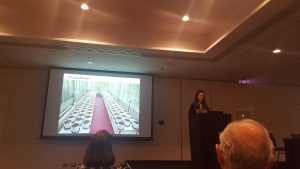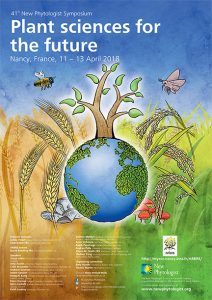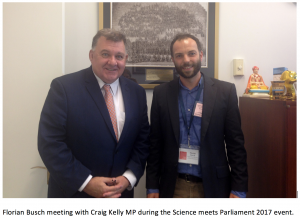- About
- Members
- Join
- Member log in
- Membership Renewal
- Member directory
- Life Members
- ASPS Life Member Professor Graham Farquhar
- ASPS Life Member Associate Professor Hendrik (Hank) Greenway
- ASPS Life Member Dr Marshall (Hal) D Hatch
- ASPS Life Member Dr Paul E Kriedmann
- ASPS Life Member Dr Mervyn Ludlow
- ASPS Life Member Emeritus Professor Rana Munns
- ASPS Life Member Conjoint Professor Christina E Offler
- ASPS Life Member Professor (Charles) Barry Osmond
- ASPS Life Member Emeritus Professor John W Patrick
- ASPS Life Member Dr Joe Wiskich
- Corresponding Members
- Elected Fellows
- Events
- Awards & Funding
- Employment
- Publications
- Research
- Teaching
- Menu
ASPS Travel Award Report Recipient Hones Presentation Skills at ComBio2017
18 October 2017
By
Viviana Rosati
Thanks to an ASPS Travel Award, I was able to attend the ComBio2017 conference this October in Adelaide, South Australia. It was personally and professionally fulfilling not only to be attending, but presenting, at my very first ComBio. The conference is the main forum for the Australian Society for Biochemistry and Molecular Biology (ASBMB), the Australia and New Zealand Society for Cell and Developmental Biology (ANZSCDB), and the Australian Society of Plant Scientists (ASPS), with the societies coming together for three days to promote the latest in research and education, as well as enable invaluable network opportunities.
 For me, a highlight of the conference was the plenary Annals of Botany Lecture on the second day featuring Professor Cathie Martin from the John Innes Centre. Professor Martin works to increase polyphenol phytonutrients in fruits: compounds with therapeutic properties that could potentially mitigate artherosclerosis and other inflammatory conditions. She emphatically stated: ‘Medicine is not healthcare, food is healthcare. Medicine is sickcare’ – an appropriate reminder for us all.
For me, a highlight of the conference was the plenary Annals of Botany Lecture on the second day featuring Professor Cathie Martin from the John Innes Centre. Professor Martin works to increase polyphenol phytonutrients in fruits: compounds with therapeutic properties that could potentially mitigate artherosclerosis and other inflammatory conditions. She emphatically stated: ‘Medicine is not healthcare, food is healthcare. Medicine is sickcare’ – an appropriate reminder for us all.
Over the next two days I attended an array of symposia including: Plant Energy Use Efficiency, Next-generation Phenotyping, Plant Walls and Membranes, Abiotic Stress Tolerance, Microbe-Plant Interactions, and Plant Reproductive Biology. All talks gave me vital insight into the current plant biology research being undertaken worldwide, and offered me several new avenues for my own research – particularly techniques to elucidate the molecular regulation of genes involved in emerging regulatory pathways. The conference delivered an impressive balance of graduate students, post-doctoral researchers, associate professors, and professors presenting their cutting-edge research or stories of discovery.
As part of the crop productivity symposium, I presented my research topic Drought Response in Low-Cyanogenic Sorghum bicolor Mutants; with the presentation being very well received. I took a number of questions during the allocated question time and was given valuable advice driving new exploration within the scope of my research program. It is now the fourth time within a two-year period that I have been a conference presenter. As one might expect, my confidence grows with each presentation and as I become more adept; and there is always a constant challenge to improve and hone my skills in order to deliver a story with a clear message that engages interest and drives impact.
I am extremely grateful to ASPS for providing funding that enabled me to attend the conference and present my research to the plant science community.
Contact: Viviana Rosati (viviana.rosati@monash.edu)
41st New Phytologist Symposium: Plant sciences for the future
18 October 2017
Registration now open!
41st New Phytologist Symposium: Plant sciences for the future
11–13 April 2018, Nancy, France
https://www.newphytologist.org/symposia/41
 The 41st New Phytologist Symposium will provide new insights into the evolutionary forces and molecular mechanisms that govern plant development and physiology, and their interactions with biotic and abiotic cues.
The 41st New Phytologist Symposium will provide new insights into the evolutionary forces and molecular mechanisms that govern plant development and physiology, and their interactions with biotic and abiotic cues.
Invited speakers from the New Phytologist Editorial Board will highlight emerging topics in plant sciences as well as the application of modern technologies to capture the complex mechanisms driving plant development, physiology, interactions and evolution.
Eighteen leading scientists will speak at the symposium along with early career researchers, selected to give talks following submission of poster abstracts. Travel grants are available.
Travel grant deadline: Thursday 18 January 2018
Poster abstract deadline: Thursday 8 February 2018
More details and registration at https://www.newphytologist.org/symposia/41.
Science Meets Parliament 2017 – optimistic futures for plant scientists
12 October 2017
By
ARC DECRA Fellow, School of Agriculture, Food and Wine
Waite Campus, University of Adelaide
Science Meets Parliament is an annual event of Science and Technology Australia (STA) bringing together 200 of Australia’s leading scientists and technologists to Canberra. This professional gathering stimulates and inform parliamentarians of how science contributes to our society and aims to inform public policy, and; to assist in professional development through providing participants with an insight into political, policy, media and parliamentary processes.
Australian Society of Plant Scientists gave me a wonderful opportunity to be a part of science meets parliament during March 2017. The event enabled me to get to know the views of some Australia’s most influential and passionate parliamentarians, science advisors, STEM professionals and media personalities.
Day one is all about professional development, building connections and collaborations . We were provided with useful tips on how to turn science into news, how science is used to shape public policy, how to convince a parliamentarian without using the word money or funding, and how to pitch my science in 60 seconds. I really felt optimistic about my future as a plant scientists after listening to the commitment of the government to further advance science and technology in years to come.
On day two, I met Hon Senators Chris Back and Chris Ketter face-to-face in their parliament office. I was really impressed by the way they listened and interacted with me to learn more about how grow crops can grow in salty soils. I was also inspired by the parliamentary speeches and organised forums during parliament. In particular, a glowing endorsement of curiosity driven by research undertaken by Professor Alan Mackay-Sim, Australian of the Year, resonated with me even after the completion of the event.
I also participated a breakfast event organised by the University of Adelaide’s external relations branch on day three which allowed me to interact as well as promote science and build new connections with South Australian parliamentarians and alumni.

Dr Jayakumar Bose, ASPS representative, and Hon Bill Shorten MP, and Leader of the Opposition at the Science Meets Parliament 2017 at the Great Hall of the Australian Parliament House in Canberra.
Contact Information: Jayakumar Bose (jayakumar.bose@adelaide.edu.au)
The different flavours of when Science meets Parliament
05 October 2017
By Florian Busch from the Australian National University, Canberra, ACT
During March 2017, parliament in Canberra became flooded with scientists of all kinds of flavours for two days as Science met Parliament in this annual event. This event aims at increasing the dialogue between politicians and scientists to increase the awareness and understanding of how STEM can drive Australia’s economic, social, environmental, and cultural future. I was lucky to be picked as one of two early/mid-career plant scientists representing the Australian Society of Plant Scientists. The two days were filled with quite unique experiences, including a full day of career development and preparation for meeting the parliamentarians, and then, of course, one big day in Parliament.
Australia’s Chief Scientist Dr. Alan Finkel opened the first day setting the scene for what to expect. This was followed by sessions on how science is turned into news and used to shape policy. The focus of the day, however, was on how to make the most of the little time we had for our meeting with the parliamentarians. How much science background could we expect? How detailed should we present our work during our meeting with the parliamentarians? In preparation, we paired up in small groups to practice our ‘elevator pitch’, where we were challenged to explain the nuances of our work in a minute or two, to people outside our fields of expertise. My major lesson from this exercise was discovering the fast pace at which politicians move from one topic to the next. This also turned out to be a great networking opportunity, allowing me to meet scientists from diverse fields of research across all of Australia. The highlight of the day, however, was a gala dinner at Parliament House, where we heard from the newly minted Minister for Industry, Innovation and Science, The Hon Arthur Sinodinos, and the Leader of the Opposition, The Hon Bill Shorten, as how they might envision science in future politics.
 On the second day, we were inspired by Australian of the Year, Prof. Alan Mackay-Sim, and had the chance to meet the Shadow Minister, The Hon Kim Carr. Lunch was broadcast live on TV at the National Press Club, where the Minister for Industry, Innovation and Science was grilled with questions from the press. The definite highlight of the day was meeting our parliamentarians. I was paired up with two other scientists to meet with MP Craig Kelly. This is when practicing our ‘elevator pitch’ the day before paid off; I only had a few minutes to discuss the role of photosynthesis research in securing food production before MP Craig Kelly ran off to his next meeting. He left us with a deep impression of how parliament works and, hopefully, we left him with some insights into how science works and can shape the economy.
On the second day, we were inspired by Australian of the Year, Prof. Alan Mackay-Sim, and had the chance to meet the Shadow Minister, The Hon Kim Carr. Lunch was broadcast live on TV at the National Press Club, where the Minister for Industry, Innovation and Science was grilled with questions from the press. The definite highlight of the day was meeting our parliamentarians. I was paired up with two other scientists to meet with MP Craig Kelly. This is when practicing our ‘elevator pitch’ the day before paid off; I only had a few minutes to discuss the role of photosynthesis research in securing food production before MP Craig Kelly ran off to his next meeting. He left us with a deep impression of how parliament works and, hopefully, we left him with some insights into how science works and can shape the economy.
Contact: Florian Busch (florian.busch@anu.edu.au) for further enquires.
GPC e-bulletin Sept
04 October 2017
|
|||||||||||||||||||||||||||||||||||||||
|
|||||||||||||||||||||||||||||||||||||||
|
|||||||||||||||||||||||||||||||||||||||
|
Recent Posts
Tags
Archives
- June 2025
- May 2025
- April 2025
- March 2025
- February 2025
- January 2025
- December 2024
- November 2024
- October 2024
- September 2024
- August 2024
- July 2024
- June 2024
- May 2024
- April 2024
- February 2024
- January 2024
- November 2023
- October 2023
- September 2023
- August 2023
- July 2023
- June 2023
- May 2023
- April 2023
- March 2023
- February 2023
- December 2022
- November 2022
- October 2022
- September 2022
- August 2022
- July 2022
- June 2022
- May 2022
- April 2022
- March 2022
- February 2022
- January 2022
- December 2021
- November 2021
- October 2021
- September 2021
- August 2021
- July 2021
- June 2021
- April 2021
- March 2021
- February 2021
- January 2021
- December 2020
- November 2020
- October 2020
- September 2020
- August 2020
- July 2020
- June 2020
- May 2020
- April 2020
- March 2020
- February 2020
- January 2020
- December 2019
- November 2019
- October 2019
- September 2019
- August 2019
- July 2019
- June 2019
- May 2019
- April 2019
- March 2019
- February 2019
- January 2019
- December 2018
- November 2018
- October 2018
- September 2018
- August 2018
- July 2018
- June 2018
- May 2018
- April 2018
- March 2018
- February 2018
- January 2018
- December 2017
- November 2017
- October 2017
- September 2017
- August 2017
- July 2017
- June 2017
- May 2017
- April 2017
- March 2017
- February 2017
- January 2017
- December 2016
- November 2016
- October 2016
- September 2016
- August 2016
- July 2016
- June 2016
- May 2016
- April 2016
- March 2016
- February 2016
- January 2016
- December 2015
- November 2015
- October 2015
- September 2015
- August 2015
- July 2015
- June 2015
- May 2015
- April 2015
- March 2015
- February 2015
- January 2015
- December 2014
- November 2014
- October 2014
- September 2014
- August 2014
- July 2014
- June 2014
Copyright 2017 Australian Society of Plant Scientists Disclaimer & Privacy
Website by Michael Major Media
